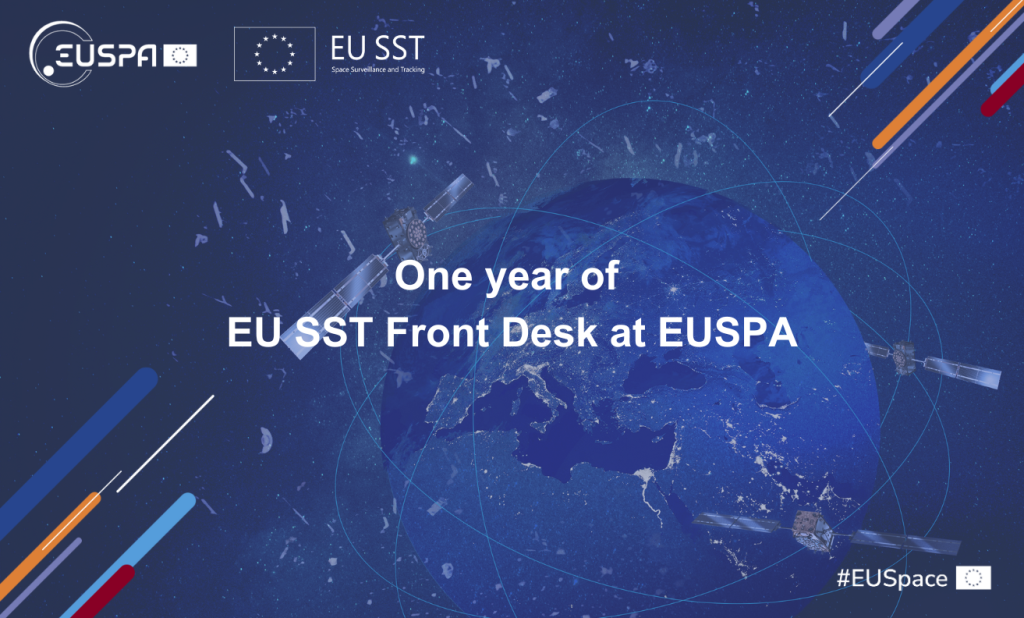One year of EU SST Front Desk at EUSPA: safeguarding our space assets

Imagine a piece of space debris orbiting the Earth uncontrolled. Even if small, it is travelling at 27,000 km an hour. At this speed, even the smallest object can have major consequences for the space environment, and with new and more diverse actors and a growing number of active space objects, the space-based applications that we use every day are increasingly at risk.
This is where EU SST, the EU Space Surveillance and Tracking, comes in.
Established by the European Union in 2014, EU SST has been part of the EU Space Programme since 2021. It is a key EU capability that helps protect space infrastructure and services from in-orbit collisions between space objects and other disruptions. EUSPA is responsible for managing and operating the EU SST Front Desk, the interface to provide SST services in cooperation with a Partnership of 15 Member States.
The Front Desk activities are managed from the Galileo Security Monitoring Centre (GSMC) in San Martín de la Vega, Madrid, Spain where EUSPA operates and maintains the SST Portal, manages service requests, provides support to users, and is responsible for user uptake, performance monitoring and communication activities.
EU SST Front Desk: a year in figures
Since EUSPA took over the EU SST Front Desk in July 2023, the EU SST user community has grown significantly. Today, more than 480 satellites (83 more than before joining EUSPA), including from non-EU operators and more than 200 organisations are registered in the SST Portal. During the Front Desk’s first year at EUSPA, more than 21,700 products for all EU SST services (Collision Avoidance, Re-entry Analysis and Fragmentation Analysis) were delivered to users through the SST Portal. More than 800 service requests – enquiries from users related to services, registration or using the Portal – were handled by the SST team.
The Front Desk contributes to the long-term sustainability of outer space activities, but also acts in critical operations when a fast response is needed. In this first year, it coordinated four activations of the EU SST Taskforce for critical events, including the monitoring of the re-entry of space object ISS DEB (EP BATTERY) and the support to ESA’s Aeolus assisted re-entry into Earth’s atmosphere.
The EU SST Front Desk embraces the EUSPA mission putting users central to their work. It is recognised in the latest user satisfaction campaign for EU SST users, carried out this year, where the Front Desk scored 8.7 out of 10. It will continue as EU SST is now part of EUSPA’s User Consultation Platform, attended for the 1st time in 2023.
“We are extremely proud of the EU SST Front Desk's success since it was handed over to EUSPA. Over the past year, the growth of the SST user community has proven the trust in EU SST services globally. The EU SST Front Desk is essential to EUSPA’s mission of enhancing EU security and safety,” states Rodrigo da Costa, EUSPA’s Executive Director.
What’s next?
In the coming years, the EU SST Front Desk will further increase the SST user community and collect its needs, contribute to expanding all its services worldwide, reach more user segments – such as aviation users – and increase synergies with other EU Space components and initiatives.
The SST Portal will continue incorporating new features and enhancements as demanded by users, including service configuration and space traffic coordination. When it comes to security, the Front Desk will support the definition of the security requirements needed to shape the SST network and contribute to its development as well as its security monitoring.
So, when considering uncontrolled space debris, remember that EU SST, with its Front Desk, is at the forefront of providing space safety services.
You can learn more about EU SST here or by reading its leaflet and factsheet.
Media note: This feature can be republished without charge provided the European Union Agency for the Space Programme (EUSPA) is acknowledged as the source at the top or the bottom of the story. You must request permission before you use any of the photographs on the site. If you republish, we would be grateful if you could link back to the EUSPA website (http://www.euspa.europa.eu).